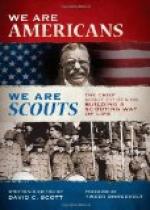When the Indians were out of sight, Carson laughed and said, “Boys, that was the easiest won battle I have ever had with the Indians, and it was not our good marksmanship that done it either, for if every shot we fired had taken effect, there would not have been half Indians enough to go around. It was the report of our guns that scared them away.”
It was figured up that night how many shots were fired, and they amounted to two hundred. Carson said, “Boys, if we get into another fight with the Indians, for God’s sake don’t throw away your powder and lead in that shape again, for before you reach Monterey, powder and lead will be worth something, as the Red skins are as thick as grass-hoppers in August.”
Of course this was the first skirmish these men had ever had with the Indians, and they were too excited to know what they were doing.
About six years ago I met a man whose name was Labor. He was the last survivor of that company, with the exception of myself, and he told me how he felt when the yelling Red skins burst upon us. Said he, “I don’t think I could have hit an Indian if he had been as big as the side of a horse, for I was shaking worse than I would if I had had the third-day Ague. Not only shaking, but I was cold all over, and I dreamed all night of seeing all kinds of Indians.”
The next day we were traveling on the back bone of a little ridge. There was no timber except a few scattering Juniper trees. We were now in Arizona, and water was very scarce. The reader will understand that Carson invariably rode from fifty to one hundred yards ahead of the command, and I always rode at his side.
I presume it was between two and three o’clock in the afternoon when Col. Freemont called out to Carson, “How far are you going tonight?”
Carson studied a minute and answered, “I think, in seven or eight miles we will find good water and a plenty of grass.”
A few minutes after this Freemont said, “Say, Carson, why not go to that lake there and camp? There is plenty of grass and water,” at the same time pointing to the south. Carson raised his head and looked at the point indicated. Then he said, “Col. there is no water or grass there.” Freemont replied, “Damn it, look. Can’t you see it?” at the same time pointing in the direction of what he supposed to be the lake. Carson checked his horse until Freemont came up near him and then said, “Col., spot this place by these little Juniper trees, and we will come back here tomorrow morning, and if you can see a lake there then I will admit that I don’t know anything about this country.”
Freemont was out of humor all the evening. He had nothing to say to any person.
The next morning after breakfast was over and the herder had driven in the horses Carson said, “Now Colonel, let’s go and see that lake.”
Under the circumstances Freemont could not say “no.” I think five of us besides Carson and Freemont went back. When we came to the place where the little Juniper trees were, Freemont’s face showed that he was badly whipped, for sure enough there was no lake there; he had seen what is called a mirage.




